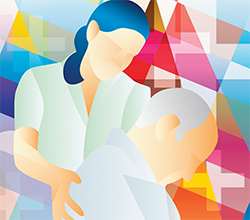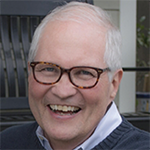
Image Credit: Pascal Fossier/CORBIS
DALLAS—Scott Morris, MD, a primary care physician, as well as an ordained United Methodist minister and founder of the Church Health Center in Memphis, gave a stirring Conley Lecture on Medical Ethics.
Explore This Issue
November 2015Dr. Morris began by telling the audience about a day when he was faced with a challenging situation: He was about to examine a teenage girl wearing a black burka.
His rule when this happens, he thought, should be to stay as far away as he could and avoid touching the patient. But he needed to hear the girl’s heart, and the girl’s father gave him permission to perform his exam.
He lifted the cloth, which was “just black on top of black on top of black. But underneath it all, she was just a teenager,” Dr. Morris said. “And she was wearing a T-shirt that said, ‘Kiss me, I’m Irish.’”
The story was a vivid flash of humanity in a world of medicine that, he says, has been overrun by technology at the expense of the human touch and spirituality. In the process, healthcare practitioners have lost their focus on what’s important.
Dr. Morris advised his colleagues that effective care requires a human touch. “Our
healthcare system is not making us healthier,” he said. “But in order to make the change, we need to stop seeing our bodies as little machines. Instead, we need to intentionally remember our humanity. Our humanity is who we are.”
Restoring the Goals of Medicine
The Church Health Center, created in Memphis in 1987 to provide quality, affordable healthcare to the uninsured, sees about 50,000 patients a year without accepting government funding. Patients are charged according to income level, and the average visit costs a patient about $25. The center has a particular focus on health education and prevention because, according to its website, its founders “believe we have a responsibility to take care of the bodies God gave us.”
Even though 17% of the gross domestic product in the U.S. is spent on healthcare, many of our outcomes are no better than those in developing countries, he said.

Image Credit: Dmitry Naumov/SHUTTERSTOCK.com
He issued a “prescription” to physicians: gentleness, kindness, compassion, humility, patience, and love. “I realize this is not how the American health system works; I know that,” Dr. Morris said. “But what we’re doing now doesn’t improve health. Who really cares if you live two years longer if that means two years longer in a nursing home? Life for life’s sake makes no sense. Breathing in; breathing out. I’m not signing up for that, are you?”
He said physicians need to remember the real goals of medicine. “If we’re not helping people achieve what I think, and I think you think as well, are the goals for living—having more joy in our life, having more love in our life, and somehow or another being connected to those things that are greater than we are—if those things aren’t happening, then what’s the point?” he asked.
Recognizing Principles for Practice
Dr. Morris offered three principles that he suggested could be helpful for doctors to live by, ideals that could help them become better doctors.
1. The person with the power has the responsibility to be kind. Dr. Morris said he couldn’t sleep one night in Memphis and took a walk, ending up in a part of town by the Mississippi River where he probably shouldn’t have been late at night. He felt someone coming toward him, which set his heart fluttering.
The person, he joked, was “at least 10 feet tall.” It was one of his patients, named Nimrod, and Dr. Morris was extremely relieved. The patient warned him not to be in that part of town at night and walked him back to his apartment.
Dr. Morris explained, “On that night, it was Nimrod who had the power. That night, Nimrod used his power with kindness, and I think it’s a principle that we all should learn from.”
 Who really cares if you live two years longer if that means two years longer in a nursing home? Life for life’s sake makes no sense. Breathing in; breathing out. I’m not signing up for that, are you?
Who really cares if you live two years longer if that means two years longer in a nursing home? Life for life’s sake makes no sense. Breathing in; breathing out. I’m not signing up for that, are you?—Scott Morris, MD
2. Everyone deserves to be first. Dr. Morris first saw his patient Henry when he was two months old. He found a retinoblastoma, which could only be treated by removing Henry’s eye. Another doctor performed the surgery, but Henry had to come to Dr. Morris’ clinic so often that he seemed to think he owned the place. When he arrived, he would walk past those in the waiting room and immediately call out, “I’m first!”
Dr. Morris hoped to see more patients like Henry. “Isn’t that what we want to do? Create a healthcare system where a child like Henry—or even you—believes that he’s first?” he asked.
3. Don’t skip the rapids. When he was a senior in high school, Dr. Morris’ mother was diagnosed with ovarian cancer and wasn’t doing very well. The next year, he was home from college for the summer and about to walk out the front door for a rafting trip with friends. His mother suddenly asked, “Can I go with you?”
Just like that, Dr. Morris’ mother was going rafting. On the last part of the trip, despite serious trepidation, she joined him and his friends on a particularly rough stretch of rapids. At one point, Dr. Morris leaned the wrong way and fell into the water, and his mother pulled him back into the raft. “At that point, when my mother was clearly dying, I think she may have been more fully alive than she ever was before,” he said.
Dr. Morris hopes his colleagues will learn from his mother’s example. “My mother didn’t skip the last rapid. She also didn’t let certainty interfere with her decision. She was actually okay to be uncertain with her future.”
The Future
Accepting uncertainty is the only way to change, Dr. Morris said. “We spend way too much time wanting to be certain about something. If that’s how you view it, you will never move things forward. We have to be comfortable with uncertainty. It’s the only way things change.”
He asked the audience to remember these lessons as they went about caring for patients. “I would also ask you not to forget the girl in the burka,” he said, pausing to unbutton his shirt and reveal a T-shirt with a green clover on it that had “Kiss Me, I’m Irish” written across it. “Because deep down inside all of us,” he said, “we’re all Irish.”
Thomas Collins is a freelance medical writer based in Florida.
Take-Home Points
- Patients are humans too, and effective patient care can’t be administered without compassion.
- The goal of medicine should not only be prolonging a patient’s life but also enriching it.
- Doctors can learn a lot from their patients about kindness, enthusiasm, and strength in the face of uncertainty.